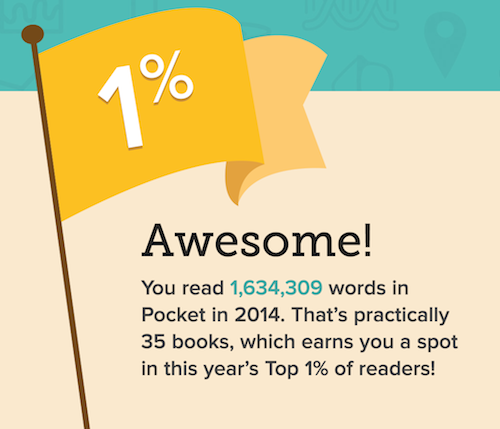Twitter, Pocket, and Books
Twitter is my primary source of news discovery. And Pocket is my primary news consumption app.
When I have a few minutes to spare, I peruse Twitter for interesting articles that I want to read [1]. When I find one, I save it to Pocket. In addition to Twitter, I’ll save articles to Pocket that friends or coworkers email to me, that I find when browsing news websites directly, that are linked to from other articles, etc.
When I have more than a few minutes, I will open up Pocket and read articles I’ve saved.
This workflow separates content discovery and consumption, and is more productive for me than doing both at once. If I sit down to read articles in Pocket, I can get through many in a short period of time. No waiting for articles to load, no back and forth between apps. Focused, concentrated reading time.
When I first began using Pocket, I was pleased with the increase in reading output. I felt myself reading more “long form” and getting deeper into topics.
In fact, I’ve become such an active Pocket user that at the end of 2014, I received an email from Pocket informing me that I was in the top 1% of readers.

That’s right, I read 1.6 million words, which Pocket has calculated is about 35 books [2].
I was initially happy to see this. It confirmed my feeling that I was reading more using Pocket, which I thought of as a good thing. I still think so, but frankly I would rather have read 35 books! Or at least gone half and half.
A friend pointed out the irony that Pocket, despite being an app for reading digital content, still gives books the high merit of the benchmark. Can you imagine finishing a book and on the last page reading, “Awesome! You just read the equivalent of 500 news articles!”
Also ironically, Pocket’s congratulatory note may end up backfiring. It was a bit of a wakeup call - read more books, less news articles. There is a tradeoff, as I enjoy being up on current events. But books allow you to go even deeper, and provide continuity from one reading session to the next (among many other benefits, of course). In 2015, I may look to convert some of those 35 “books” I read into actual books.
Footnotes:
[1] Naturally, whom I follow on Twitter has a large impact on the news I am consuming. Therefore, I do spend some time curating the list of whom I follow. One of the reasons I like Twitter is because my feed is a unique blend of my various unrelated interests - something you cannot get from traditional media.
[2] That comes out to 46,694 words per book. On the short side, but otherwise seems like an okay assumption.
Tags: